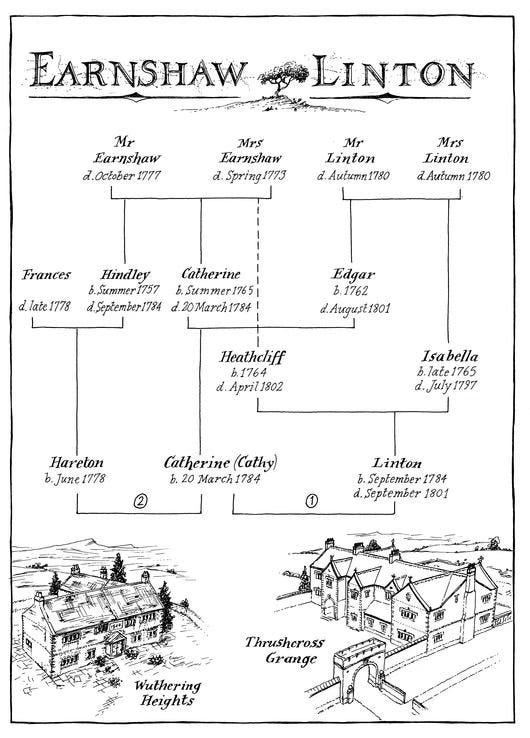Having disappeared for three years after hearing Catherine tell Nelly that she couldn’t lower herself to ever marrying him, Heathcliff returns, six months after Catherine’s marriage to Edgar Linton, and now he’s rich and well-mannered (in public). Spoilers ahead!
Despite Lockwood’s pushing, Nelly says she doesn’t know where Heathcliff was for all that time, nor how he’s made a fortune to come back with. She goes on with recounting the history of the families, though, picking up with Heathcliff’s return. He tells Catherine that Hindley has asked him to stay at Wuthering Heights, much to everyone’s surprise. Catherine and Isabella start to visit Wuthering Heights again, Isabella falls in love with this new Heathcliff, and Heathcliff grabs the opportunity to wedge himself into life at Thrushcross Grange.
He’s also been pitting Hindley’s son, Hareton, against his father — teaching him to swear and throw stones and forbidding his teacher to come by, in a kind of parallel to Hindley’s treatment of Heathcliff when he inherited the house.
Nelly catches Heathcliff and Isabella together, and tells Catherine, who offers to speak to Edgar about allowing them to marry, if Heathcliff really is in love with her. Heathcliff refuses Catherine’s help, telling her instead that he intends to get his revenge for her having abandoned him and married Edgar. When Edgar finds out what is going on, he confronts Heathcliff, and the two men are goaded into a fight by Catherine (because honestly everyone in this book is a horrible person). Edgar realises that he cannot physically stand up to Heathcliff, and after sticking him once, he runs away to find help. Heathcliff decides that the fight is not worth having, and leaves.
Edgar attempts to give Catherine an ultimatum — she must choose him or Heathcliff — and this results in Catherine locking herself in her room and refusing to eat. Edgar does not go to try to convince her, and when she finally relents and lets the servants in, they find her hysterical. Edgar finally comes to see her, and is shocked that she is in such a state. Nelly calls for the doctor, who predicts that Catherine will make a good recovery, despite Catherine predicting her own death and the restlessness of her spirit, lost on the moors and searching for Heathcliff. While all this is going on, Heathcliff and Isabella elope.
Poor mad Catherine is nursed back towards health by Nelly and Edgar, and they find that she is pregnant. Isabella writes to Edgar, begging forgiveness and describing how awful a time she is having at Wuthering Heights with her new husband, who, it turns out, is acting out his hatred of the Linton’s, using Isabella in place of her brother. Isabella has realised her terrible mistake in marrying Heathcliff, but can’t see an escape.
Heathcliff, unsurprisingly, turns out to be a truly cruel and tormenting figure. His wealth has given him new status as a powerful man, and he now has the means to carry out any vengeful plans he likes. He writes to Catherine, but she is so weak that she can barely hold the letter, so he goes to visit her while Edgar is away. He is horrified by what he sees, telling her that she deserves to die, that he can never forgive her murderer, and she collapses. As Edgar returns, Heathcliff leaves. Catherine gives birth to a daughter (“an unwelcomed infant it was, poor thing!”), Cathy, and dies two hours later. Heathcliff curses her, and — mirroring her vision of herself lost on the moors — begs her to haunt him for the rest of his life, so that they will not be apart.
Last week, I linked to Sylvia Plath and Ted Hughes’ two Wuthering Heights poems — Plath’s meditation on the landscape at Top Withings: the horizon hemming her in, the sheep bleating, the heather threatening to drag her into the ground. Hughes’, a Birthday Letter, watching Sylvia wend her way through the moors, writing about her writing, effusive about her incredible talents, her ambition, her efforts and aspirations.
Wuthering Heights topped a poll of the best classic love stories for the Guardian, and I honestly have to pause to ask if any of the people voting for it had actually read it. Like Heathcliff and Catherine, Plath and Hughes’ relationship is often mythologised and romanticised; two great, passionate people fated to one another, ending in tragic, unavoidable, doom. Wuthering Heights is many things, but it’s not a love story.
More reading…
Anne Rice’s Amazon review of Wuthering Heights (yes, really)
The casting director Kharmel Cochran has said of Jacob Elordi and Margot Robbie’s casting: “[Y]ou really don’t need to be accurate. It’s just a book.” Eep.
The Strange Cult of Emily Brontë and the “Hot Mess” of Wuthering Heights
The buddy reads are for everyone to join in on, but if you’re considering a subscription, you’ll gain access to writing prompts and community posts, plus discounts on our courses and workshops. This Substack is reader-supported, and paid subscriptions mean I can do more of it!
See you next week!






